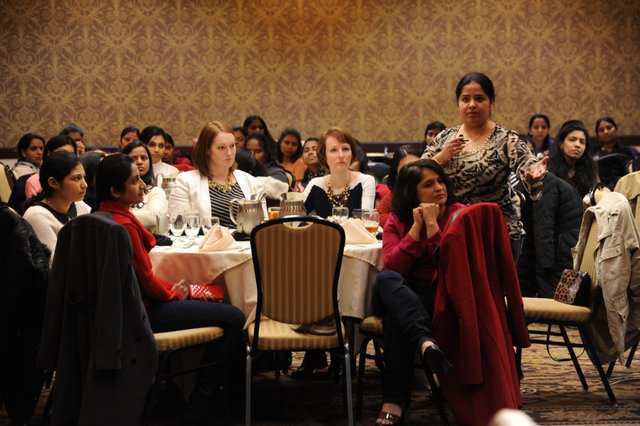English with Fiona: About writing and speaking
When it comes to writing and speaking, people often think that they're poles apart.
In some ways they are.
In other ways, they're quite similar. We see these similarities in the answers to these questions:
Who am I...
...speaking to?
...writing for?
What will I be...
...speaking about?
...writing about?
Where will...
….I be speaking?
…my piece of writing be read or published?
Now, thinking about these questions, take a look at the photographs (there are lots) below:












Photographs: Unsplash
In these photographs, we see a few things: people in different places, in pairs, in groups, both formal and informal as well as public, professional and private.
Who?
Writing and speaking for different audiences and contexts
When we speak and write, we "talk" to a range of audiences. For example:
-
-
- one person or one-to-one:
- over a cup of coffee with a friend
- with a co-worker or teacher
- to a group:
- a formal presentation at work or to colleagues at a conference or seminar
- less formally, from the floor, as part of a discussion at a conference, seminar or workshop
- outside work or study, at a family or religious gathering
- one person or one-to-one:
-
What?
Writing and speaking about different topics
The topics or subjects about which we write and speak are as diverse as the audiences:
-
-
- At work, both our writing and our speaking will focus on the type of business, so it could range from technology to cosmetics, computers to cooking and anything in between.
- At college, the topics will focus on our studies and the discipline
-
Here, the content for both writing and speaking will be very much the same, but the tone and formality of the language will vary. This depends on the answer to the "who" question, i.e. the audience and context.
Where?
The place where people will listen to you and/or read your writing
When we write something, we need to bear in mind where is the person or group the will read what we write. For example:
-
-
- In business and in the workplace
- emails to colleagues, superiors, subordinates and clients
- reports
- blogs
- magazine articles
- At school, college and university
- projects
- essays and papers
- learned publications
- At home or socially
- posts on the social media
- text messages
- In business and in the workplace
-
When we speak, we also have to consider where we're talking:
-
-
- In business and in the workplace
- meetings
- presentations
- workshops
- conferences
- At school, college and university
- tutorials
- seminars
- presentations
- conferences
- At home or socially
- family gathering like a wedding or milestone birthday
- church or other social club
- In business and in the workplace
-
So, it's helpful to answer these questions be for you write and before you speak.
For online English tutoring, click here to contact me on Discord or contact me via my [website](https://englishandstuffwithfiona.wordpress.com/) where this article was originally posted.
Next time, I'll look at the writing process...
Until then, be well
Fiona
The Sandbag House
McGregor, South Africa

Photo: Selma
Post Script
And then there's more:
- If this post might seem familiar, it's because I'm doing two things:
- If you’re interested in a soft entry into the world of crypto currency and monetising WordPress blog, use the fantastic Steempress plugin to post directly to the Hive blockchain. Click on the image below to sign up

- I’m still blogging on Steem with the occasional post on Medium.

Thank you @fionasfavourites, for using the CO2 Compensation Coin (COCO) to reduce your CO2 footprint.
hi fiona , very informational content about writing and speaking. keep on !!
Thanks so much, @luckyhali, I plan to!
Truly they are not too far apart. I think vocalization and confidence might be the difference and these two things really sets them apart. I feel public speaking is another skill entirely even if you speak well. Getting the attention of people can be so challenging. But in total I think with writing public speaking might be alot easier. Accent is also another problem.
I agree. This is just a starting point. Then we work with the other issues - based on the learner's specific needs.
Appreciate your comment and thanks for stopping by @bhoa!
This information helps us to understand the differences and similarities between speaking and writing. Very useful for me. Thanks.